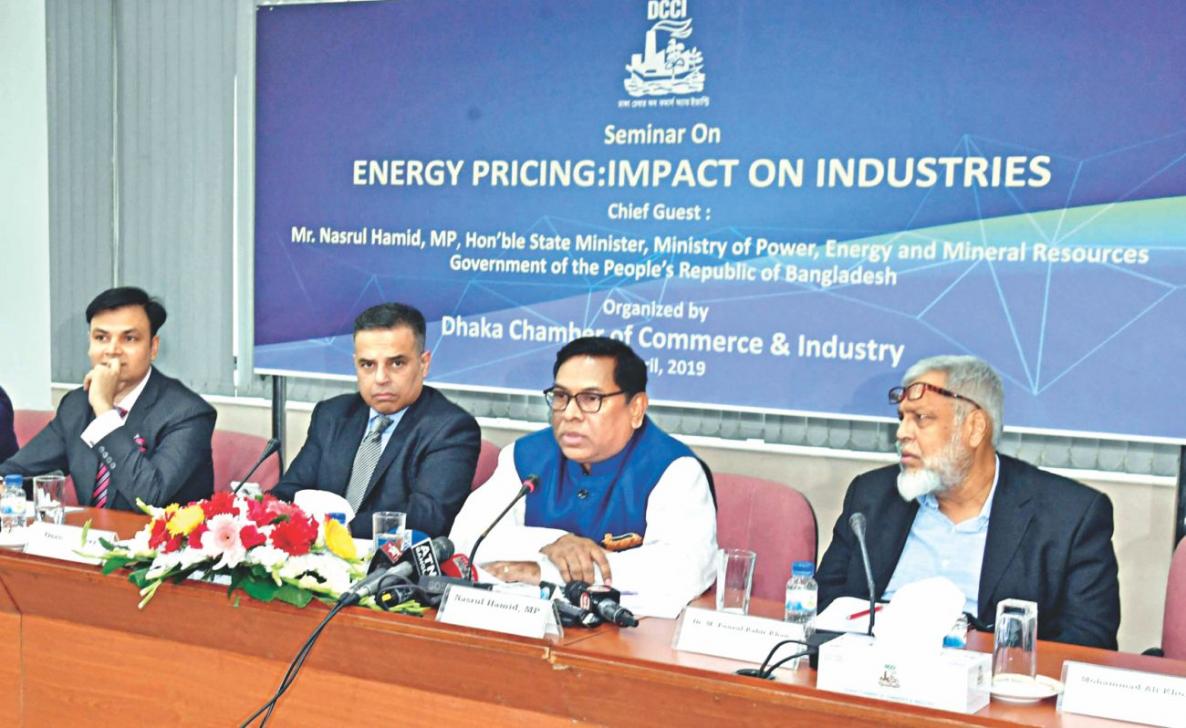Gas price hike to hit industries

The proposed hike in gas price will take a heavy toll on the industries which are highly dependent on gas to run their factories, entrepreneurs said yesterday.
“Input costs will go up for the energy-intensive industries that produce fertilizer, textile, garments, cement, and steel if the gas price is hiked,” said Osama Taseer, president of Dhaka Chamber of Commerce and Industry (DCCI).
He said Bangladesh needs to lower energy tariff and ensure uninterrupted supply to remain competitive against its competitors such as Vietnam, Indonesia, Myanmar and Cambodia.
“Otherwise, it will create roadblock in achieving our long-term economic visions.”
The impact of the proposed tariff hike will be severe for small and medium enterprises in the entire manufacturing value chain, Taseer said at a seminar on “Energy pricing: impact on industries” at the DCCI auditorium in the capital.
As per the proposals of state-owned gas companies, power plants will pay Tk 9.74 per cubic metre of gas instead of the existing rate of Tk 3.16 -- a rise of 208 percent.
They have proposed increasing the tariff by 96 percent to Tk 18.88 per unit from Tk 9.62 for captive power and by 132 percent to Tk 18.04 per unit from Tk 7.76 for industries.
The government has moved to increase the gas price following the beginning of the import of liquefied natural gas amid fast-depleting domestic gas reserves, growing demand and no new discoveries.
The textile millers had to use captive generators to get uninterrupted supply of electricity, said Mohammad Ali Khokon, president of the Bangladesh Textile Mills Association.
“We failed to meet the shipment deadline in several occasions due to low gas pressure. But we had to clear the entire gas bill,” he added.
Khokon requested not to hike the price of gas for the sake of industrialisation.
Ijaz Hossain, a professor of the Bangladesh University of Engineering and Technology, said it was true that the price increase would affect many sectors which may ultimately have an impact on exports.
“If we could pass the increased energy price to buyers, our entrepreneurs will not be impacted. But it is very tough, so energy price should be competitive.”
While presenting a paper, M Fouzul Kabir Khan, former secretary of the power division, said the gas tariff hike would affect the electricity price, inflation and the national economy.
Due to gas and electricity price hike, the non-food inflation will increase by 1.5 percentage points and 1.05 percentage points respectively, he said. “So, the government should raise the price gradually instead of hiking it steeply.”
Khan recommended investing more on renewable energy, coal and nuclear solutions and also proposed introducing energy-efficient building code, disconnecting illegal gas connections, collecting arrear bills and encouraging use of liquefied petroleum gas (LPG).
The proposed hike is an adjustment, not an increase, said Nasrul Hamid, state minister for power, energy and mineral resources. “The adjustment will continue as huge subsidies for it can't be afforded for a long time.”
Hamid said the price adjustment would not affect industries to a large extent if they use electricity from the national grid instead of producing power from gas through captive generators on their own.
Captive generator is the most inefficient system, so the government is discouraging it, the state minister said, adding that the price of gas used by captive generators would go up many folds in the future.
“Keep faith on us. We always stand by entrepreneurs. But please repay your dues and don't use bypass line. Bypass lines are making energy costly.”
According to data from the energy ministry, at least Tk 12,662 crore is outstanding in electricity and gas bills in the private and public sectors.
